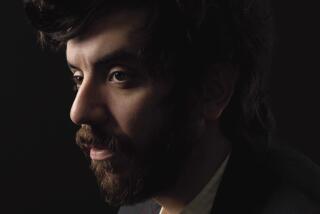‘I came to America on Wednesday, I went to work on Friday.’
- Share via
As a young Armenian boy, Leon Attarian survived when the rest of his family perished during World War I. His life’s journey has brought him from Turkey to Studio City, where he and his wife, Anna, run a small shoe-repair shop.
I was 13 years old when the war started. In 1915 the Turks killed some of our people and drove 20,000 Armenians, including me, my mother and 13 sisters and brothers, into the Syrian desert to die. There was malaria, typhus and starvation. When everybody in my family passed away, I made up my mind to go to Aleppo, a big city, to get lost. I was dirty, filthy and half-starved. A good wind could blow me down.
I got a job working in the German military hotel in Aleppo through some relative who was married to a German woman. When they were losing the war, they went home. I stayed in Aleppo until the British invaded.
The British parked outside Aleppo in different groups. Australians, New Zealanders, English and Egyptians were all in the British army at that time. I got a basket full of bread, eggs, oranges and walnut cake and started to sell to the soldiers. I liked the Australian boys best. They were honest.
When I came to America in 1920, I didn’t expect anything from anybody. I said to my uncle, “Uncle, I want to go to work.” He says, “What? You just came here yesterday.” I said, “I know. I want to work.” I met some people from our home town at the Armenian picnic in Hyde Park. They liked me so much they gave me a job in their shoe-repair shop in South Boston. I came to America on Wednesday, I went to work on Friday.
Two years later I started my own shop in Cambridge. Later I moved to Albany, N.Y., where I had my own shop for several years. In the East, shoemakers borrow money in the wintertime to pay the rent. By the time they pay what they owe, the next winter catches up. By 1950 I finally got fed up. I says, “California, here I come!”
Fixing shoes is a trade. Either you can louse it up or do it right. Some shoemakers can do a job in half an hour. I might spend two hours to fix it right. I do clean work, like stitching a sole and heel job. I pick the stitches one by one, by hand. Some of them have over 100 stitches. Then the new stitches fall in the same hole--you can’t miss them. You’d never know the shoe was resoled.
It’s not that I enjoy my work. I earn a living. I satisfy my family. That’s the great enjoyment, pleasing your family, paying your bills. You don’t owe anybody anything and you have a happy home. The collector never came to our house or to our store.
When you have your own business, if you don’t like a customer you can tell him to go to hell. I’m very independent. I don’t let nobody spit on me. The ones you like, you’ll be smiling, talk to them nicely. So that’s life. Take and give, give and take.
I charge more, yet I have more business because people are satisfied. They tell one another. I have customers come 40, 50, 60 miles away. My wife says, “You’re too fussy.” I says, “That’s the way I am. That’s the way I built a good business.”
When I was young, before the war, my father passed away, but my mother was a hustler. She supported us. She worked. She wanted to keep on sending us to school. She used to say to me, “You want something, you have to work for it.” That’s the way our parents taught us. Nothing’s free in this world.
My mother had 14 children, and I was the only one they didn’t expect to live. I was small. I couldn’t take a clear breath for four days. They said, “This baby will never survive.” But I’m the only one who did survive through all that hell. Here I am, going on 84. I’m still working, and I have a good family, healthy children--what else can a man ask for?
More to Read
Sign up for Essential California
The most important California stories and recommendations in your inbox every morning.
You may occasionally receive promotional content from the Los Angeles Times.













